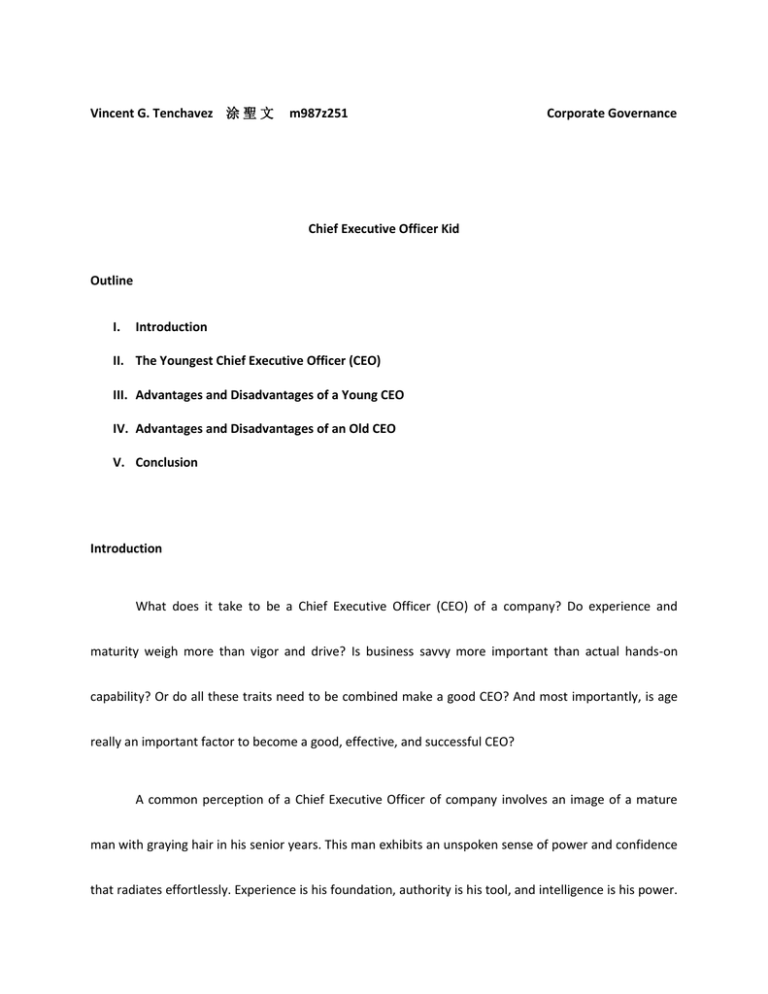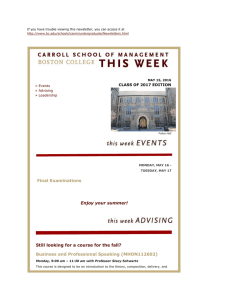
Vincent G. Tenchavez 涂 聖 文
m987z251
Corporate Governance
Chief Executive Officer Kid
Outline
I.
Introduction
II. The Youngest Chief Executive Officer (CEO)
III. Advantages and Disadvantages of a Young CEO
IV. Advantages and Disadvantages of an Old CEO
V. Conclusion
Introduction
What does it take to be a Chief Executive Officer (CEO) of a company? Do experience and
maturity weigh more than vigor and drive? Is business savvy more important than actual hands-on
capability? Or do all these traits need to be combined make a good CEO? And most importantly, is age
really an important factor to become a good, effective, and successful CEO?
A common perception of a Chief Executive Officer of company involves an image of a mature
man with graying hair in his senior years. This man exhibits an unspoken sense of power and confidence
that radiates effortlessly. Experience is his foundation, authority is his tool, and intelligence is his power.
He has a long list of achievements in his career. He probably spent a good number of years building his
portfolio of accomplishments in that same company he is heading. Or the portfolio can be built from
experiences from a collection of other big companies, where his successful endeavors have attracted the
eye of the board, making the members get him on board
But in recent years, especially with the booming advancements especially in the Information
Technology industry, a new breed of CEOs has come forth. No longer was the title “CEO” limited to the
well-experienced, mature big bosses - teenagers who haven’t even reached their legal ages have been
also labeled as such and have done quite well.
Perhaps the most famous “CEO kid” is Suhas Gopinath, who became the world’s youngest CEO
at the age of 17.
The Youngest Chief Executive Officer (CEO)
World Amazing Records as reported by Paayan in 2005 reported that Suhas Gopinath became
the youngest CEO at the age of 17. “Bangalore boy Suhas Gopinath launched Globals Inc. at 14.” Nasar
says his company “offices in more than 11 countries which includes USA, UK, Germany, Russia, Italy,
Spain, Australia, India, Bangladesh, etc which offers tailor made solutions in the fields of web, mobile,
networking, e-commerce and software solutions.”
This is not bad for a company established by a 14 year old boy who originally didn’t have his own
office, knew nothing of the internet, and used to do all the learning and programming in an internet café.
“‘I had no knowledge of the Internet. But when I was browsing the Internet in a cyber cafe I stumbled on
a source code of a web site. I was fascinated and thought long and hard. I soon launched my own
website, www.coolhindustan.com.’’ (Gopinath Interview by IT.com, 2003)
India during that time did not allow minors to set up their own companies. So Gopinath set up
Globals Inc. at San Jose, California in the year 2000. From there, everything went upwards. Globals Inc.
has drastically grown as a Multinational company, and Gopinath at the age of 16 was recognized as the
world's youngest entrepreneur in by CNBC and e-Business, Canada.
With this at the age of 17 he was recognized as the "World's Youngest CEO" by leading Medias
across the globe including BBC, CBS News, Washington Times, IndianExpress, Streats-Singapore, Times
of India, NDTV, The Age – Australia, etc.
Gopinath clearly showed the world that age is not a barrier in becoming a successful CEO. Given
the success of his company, Gopinath clearly has a long way to go given his very young age.
Advantages and Disadvantages of a Young CEO
Gopinath has shown that there are a lot of advantages of being a very young CEO. Gopinath has
exhibited a strong drive in achieving what he wants, despite not having the formal education to back it
up. It also clearly showed that Gopinath is able to learn a lot very fast, being able to grow his talent and
portfolio from simple computer programming to establishing his own little IT empire. Lukaszewski says
that “There is no school for CEOs. Even if he/she comes to the job with extensive prior experience, each
organization is unique with culturally specific attributes. Therefore all CEOs get their training on the job
from the very beginning.” (2002) Given this, it is important to note that Gopinath has the first and
primary knowledge about his company because he is the one who built it from scratch. Obviously, this is
one of the reasons why he became such a successful CEO for his company.
Another reason for Gopinath’s success is his “fresh” look on his own business against previously
established companies. Paayan reports that Gopinath’s firm “is a 60-member strong with all of them
aged 17 to 22 years.” (2005) In an interview with InterNext Technologies Inc.’s CEO, Mr. Vikas Kedia, he
says that, “The advantages of being a young CEO is that it is more likely that he will not have any preconceived notion about how a big company works. This can be of value at times since he can look at
things with fresh eyes and look at problems with a new perspective.” (Jagani, nd)
However, being young also has its share of disadvantages. Paayan said that when Gopinath got
his first big client at the young age of 14, he was told that he was too young to sign the dotted line.
(2005) Even though he was showing great potential for himself and his company, his age has become a
barrier in terms of undertaking legal transactions. And in a CEO’s world, “every word he utters, every
aside he whispers, is heard by others--at least within your own firm--as the revealed word of God,”
(Brandt, 2001) But the problem is that this “god” is not yet of the right age to be “legally” heard.
In all these, what we can get about the advantages and disadvantages of being a young CEO –
talent can be abundant, experience can be optional, legality can sometimes be a problem, but success is
very much attainable.
Advantages and Disadvantages of an Old CEO
Kedia says that “An entrepreneur with 25 years of experience turned CEO in the corporate world,
has a better idea about how a big company runs. He is better suited to design systems that can scale.”
(Jagani, nd) But clearly, experience plays a big role in becoming a successful CEO. It can give you an
established sense of not only how a company works, but also how people work and behave. And this
knowledge is a valuable tool when tasked to be the top man in any company.
Lukaszewski says that, “The CEO is the only individual within the organization with a total view
of its environment. No one else has the perspective insight to truly understand where things have to
head. Only the Chief Executive's personal communications power can penetrate the entire organization
to make his/her view and vision the goal.” (2002) This requires a great deal of maturity and authority to
execute. A mature CEO can easily have the traits to execute this just because of his extensive experience
in the business world. It is a combination of capability acquired through skill development and training,
and also business-savvy acquired through actual first-hand experience in the “battlefield” of the
business world.
Although there is no clear disadvantage of being a mature CEO, we can suggest that sometimes
being “old” can be a disadvantage in itself. Looking at the opposite of authority and capability, we can
say that sometimes age can narrow the vision and harden a person. Sometimes, someone who has
extensive experience, rely too much on experience and history, and will not be able to adopt fresh and
new ideas. Some operate based on the book, strictly adhering to tenets established through years of
experience and never daring to divert from the path cemented by his or her own rules.
Another things is that age itself is a disadvantage. “The average tenure of U.S. and Canadian
CEOs continues to decline. The current range, depending on the study, is 40 months moving to 30. Yet,
most organizations still develop strategic plans that extend well into territory occupied by a new regime.
It would appear that this is a fundamental disconnect, which probably needs a remedy.” (Lukaszewski,
2002) Given this figure, sometimes a CEO may have a good vision and great goals for the company, but
tenure and age limits him or her from seeing the plans through, and more than just building the
foundations for a successor to build on. If the current CEO and the future successor are not inclined to
the same goals, then all efforts and time would have been wasted. Every turnover of the position of CEO
would be a point of starting over for the company.
Conclusion
Clearly being a young or old CEO has its own sets of advantages and disadvantages. The young
CEO has guts, a strong drive and vigor but can be held back by legality, maturity and business-savvy. An
old CEO has rich experience, business-savy, maturity, and authority but can be slowed down by age,
narrowing of fresh ideas, and resistance to change.
Ideally, what we need is a young old CEO. And I am sure that there are CEO like this who exist in
the business world. These are CEOs who have the drive and vigor, who are equipped with experience
and maturity, who have great vision for the company but is not limited to traditional approaches to
problems, who are open to new ideas and are willing to take calculated risks.
But still the question remains: Is age really an important factor to become a good, effective, and
successful CEO? In my personal opinion, I think it is. Experience is always a good thing to have when it
comes to doing different things. But this belief wouldn’t stop me from rooting for a young CEO who is
clearly capable of bringing a company to new and greater heights. As Suhas Gopinath at the young age
of 17 has proven, you are never too young to conquer the world.
SOURCES
Brandt, John. Passing The Word - chief executive officers rediscover customer value. The Chief
Executive. Chief Executive Publishing. June 2001.
Jagani, Khyati. Interview with Mr. Vikas Kedia, CEO, InterNext Technologies Inc. The CEO Insights (n.d.).
http://www.theceoinsights.com/. Accessed on June 15, 2010.
Lukaszewski, James E. SHORTER CEO TENURE REQUIRES EVEN MORE STRATEGIC COMMUNICATIONS
COUNSEL. Article Submission to Corporate Communications Yearbook. Copyright © 2002, James E.
Lukaszewski.
All rights reserved. http://www.e911.com/monos/A013-shorterceotenure.htm.
Accessed on June 20, 2010.
Nasar.
-
PROFILE
World's
OF
Youngest
SUHAS
CEO.
GOPINATH,
(n.d.).
CEO
&
PRESIDENT,
GLOBALS
http://www.citehr.com/83454-worlds-youngest-ceo.html.
Accessed on June 18, 2010.
Paayan, S. World's Youngest CEO - Suhas Gopinath - Globals Inc. World Records by Paavan S Targetseo.com - SEO India. Friday, December 16, 2005.
http://www.worldamazingrecords.com/2005/12/worlds-youngest-ceo-suhas-gopinath.html.
Accessed on June 18, 2010.
INC.

